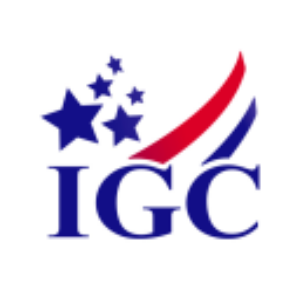IGC Pharma Announces Research Demonstrating New Molecule IGC-1C Targets Tau Protein in Alzheimer's Disease
IGC-1C Targets Tau Protein and GLP-1 Receptor, Offering a Multi-Pathway Approach to Neurodegenerative and Metabolic Disease Treatment
Additionally, the Company previously announced that IGC-1C along with IGC-1A have been identified by the Company's Artificial Intelligence ("AI") model as potential GLP-1 receptor agonists, offering promise as candidates for weight loss treatments and presenting a unique strategy to combat Alzheimer's disease.
Preclinical investigations indicate that IGC-1C exhibits a dissociation constant (Kd) of 3.95 ± 0.32 μM with tau, demonstrating a robust binding affinity that supports its potential as a therapeutic agent. The Kd value reflects the strength of the interaction between IGC-1C and tau, and this high affinity reinforces IGC-1C's efficacy in modulating tau protein, which is involved in the formation of neurofibrillary tangles, a key hallmark of Alzheimer's disease.
IGC-1C, a cyclic dipeptide-based small-molecule modulator, represents a pioneering approach to addressing tau-related pathology. The in-vitro research shows that IGC-1C effectively inhibits tau condensates formed by zinc-induced liquid-liquid phase separation ("LLPS") and prevents their transition into toxic fibrils. By disrupting this phase separation and aggregation process, IGC-1C could, subject to more trials, halt the formation of tau tangles, offering a potential breakthrough in slowing Alzheimer's progression.
"Our discovery of IGC-1C's potential dual action, targeting both tau and GLP-1 receptors, marks a significant advancement in our Alzheimer's disease research and treatment," said Ram Mukunda, CEO of IGC Pharma. "This innovative approach aligns with our broader strategy to develop and leverage several assets in the metabolic disease space, aiming to improve treatment outcomes for Alzheimer's, metabolic disorders and obesity. By addressing the emerging focus on tau tangles and incorporating GLP-1 receptor modulation, IGC-1C positions itself at the forefront of developing transformative therapies, providing a comprehensive strategy for slowing progression and improving patient outcomes. We are committed to advancing our molecules through future clinical trials, fully realizing its potential to deliver transformative therapies and drive substantial value for our shareholders."
Tau pathology in Alzheimer's is driven by hyperphosphorylation, where tau proteins form neurotoxic tangles strongly correlated with significant cognitive decline, memory loss, and other debilitating symptoms. Neurofibrillary tangles typically appear in the later stages of Alzheimer's disease and are a vital indicator of the disease's progression.
In addition to its impact on tau pathology, IGC-1C has been identified as a potential GLP-1 receptor agonist. GLP-1 (glucagon-like peptide-1) is a hormone with receptors throughout the brain, including areas affected by Alzheimer's. Research indicates that GLP-1 has been shown to be neuroprotective against Aβ toxicity by reducing oxidative stress and inflammation, increasing Aβ clearance, improving insulin signaling, and promoting neurogenesis. This dual mechanism positions IGC-1C as a promising candidate for treating weight loss, and neurodegenerative and metabolic disorders, although there can be no assurance thereof.
About IGC Pharma (dba IGC):
IGC Pharma is an AI-powered, clinical-stage biotechnology company focused on developing innovative treatments for Alzheimer's disease and transforming patient care with fast-acting, safe, and effective solutions. Our portfolio includes the TGR family, including TGR-63, which targets amyloid plaques, a hallmark of Alzheimer's. The IGC-C and IGC-M platforms are advancing in preclinical studies, focusing on metabolic disorders, tau proteins, early plaque formation, and multiple disease hallmarks. Our lead therapeutic candidate, IGC-AD1, is a cannabinoid-based treatment currently in a Phase 2 trial for agitation in dementia associated with Alzheimer's (clinicaltrials.gov, NCT05543681). Interim data for IGC-AD1 demonstrated that it has the potential to transform patient care by offering faster-acting and more effective relief compared to traditional medications. Additionally, our AI models are designed to predict potential biomarkers for the early detection of Alzheimer's, optimize clinical trials, and predict receptor affinity, among others. With 28 patent filings and a commitment to innovation, IGC Pharma is dedicated to advancing pharmaceutical treatments and improving the lives of those affected by Alzheimer's and related conditions.
Forward-looking Statements
This press release contains forward-looking statements. These forward-looking statements are based largely on IGC Pharma's expectations and are subject to several risks and uncertainties, certain of which are beyond IGC Pharma's control. Actual results could differ materially from these forward-looking statements as a result of, among other factors, the Company's failure or inability to commercialize one or more of the Company's products or technologies, including the products or formulations described in this release, or failure to obtain regulatory approval for the products or formulations, where required, or government regulations affecting AI or the AI algorithms not working as intended or producing accurate predictions; general economic conditions that are less favorable than expected; the FDA's general position regarding cannabis- and hemp-based products; and other factors, many of which are discussed in IGC Pharma's
View source version on businesswire.com: https://www.businesswire.com/news/home/20240822040435/en/
IMS Investor Relations
Rosalyn Christian / Walter Frank
igc@imsinvestorrelations.com
(203) 972-9200
Source: IGC Pharma, Inc.







